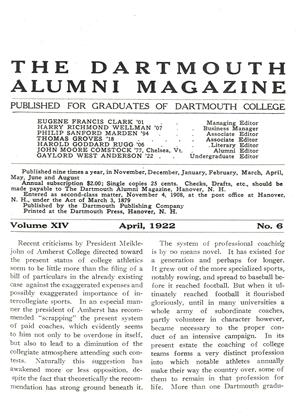President Hopkins, in reply to a questionnaire sent to the heads of the larger colleges by the New York World on the question of professionalism in athletics, suggests the establishment of an honor code rather than additional rules.
The World wished to find out if, in the opinion of the presidents, more drastic regulations are necessary to keep professionalism out of colleges and asked particularly about the playing of professional baseball by college athletes during the summer months. The complete reply of President Hopkins as printed in the World, is as follows:
"I do not believe that more drastic rules are needed than exist in most of the self-respecting colleges to control college. athletic evils, such as recruiting, proselyting, and semi-professionalism; but I do believe that the rules which exist need clarification and explanation to a degree that shall make manifest not only their propriety but their desirability for the good of sport.
"I have always contended in discussions of the so-called honor system in colleges that there was no use in establishing an honor system unless you could possess yourself of an honor code. In some way I feel that the need is more distinctly for a code in athletics than it is for more regulations. I recognize perfectly, however, that the establishment of a code is dependent upon much more in the way of detailed explanation, both within the colleges and without the colleges, than has always been existent.
"I might say in passing, likewise, that such work as" has been done in the columns of the better sporting pages of the country has been invaluable. When all is done and said, breaches of the code of amateurism in college sport are more likely to go back to careless individuals among the alumni bodies than among the undergraduates, and the newspapers of the country are more influential with the alumni than are the college administrations.
"In my estimation it is highly inadequate to remove the restrictions governing the vacation periods so as to permit the undergraduates to play summer baseball for money. The usual procedure is that a comparatively unknown lad shows athletic ability within his college and earns a place upon the college team and acquires the prestige of undergraduates standing and a college letter. Thereupon he is offered the chance of capitalizing his amateur accomplishment by agents for semi-professional enterprises in which the 'professional' accented considerably more than the 'semi-'. He then commercializes the recognition given to him for amateur effort, and I can see no reason why he should continue to have his cake and eat it too, or in other words, to be honored on the basis of being an amateur and to be paid as though he were a professional.
"There is much of mushy argument at this point. The glory of college athletics-and the only glory—is their amateurism. I have nothing but admiration for the professional athlete who desires a college education and no one denies him the opportunity for paying for his college education by the financial returns of his vacation period in athletics. The professional athlete is not denied the opportunity of securing a college education or even of earning it by his athletic ability, but there is no reason why he should not be denied the opportunity of posing as an amateur or of playing on amateur teams."
 View Full Issue
View Full Issue
More From This Issue
-
 Article
ArticleTHE GOVERNOR'S ROAD
April 1922 By NATHANIEL L. GOODRICH -
 Article
ArticleRecent criticisms by President Meiklejohn of Amherst College directed toward
April 1922 -
 Sports
SportsBASKETBALL
April 1922 -
 Article
ArticleRECOLLECTIONS OF RUFUS CHOATE
April 1922 By Miss M. A. CRUIKSHANK -
 Class Notes
Class NotesCLASS OF 1911
April 1922 By Nathaniel G. Burleigh -
 Article
ArticleNOTES
April 1922
Article
-
 Article
ArticleMEDICAL SCHOOL GRADUATES MEET IN HANOVER
November 1923 -
 Article
ArticleTHOUSANDS OF STUDENTS DISCUSS WORLD'S AILMENTS
February, 1924 -
 Article
ArticlePhilosophy Post Filled
June 1935 -
 Article
ArticleGive a Rouse
JANUARY 1998 -
 Article
ArticleMedical School
DECEMBER 1958 By HARRY W. SAVAGE '26 -
 Article
ArticleMY DISCOVERY OF THE WOODS
June 1925 By Leon Loeb '27


